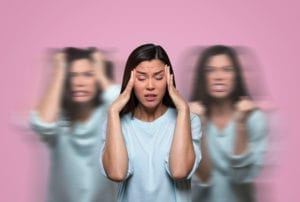Anxiety is one of the most common disorders that a person can face in their lifetime. Whether it is situational or generalized, it affects forty million adults in the United States.
Many people don’t even realize that they are suffering from anxiety, or they think that it’s a normal feeling that everyone experiences. For those in addiction recovery, it’s especially important to identify anxiety and learn to cope with it in a healthy way since these feelings can often lead to relapse if left untreated.
Symptoms of Anxiety Disorder
There are many symptoms that can be experienced as a result of an anxiety disorder. Symptoms come in different sectors, some of which are listed below.
- Behavioral: hypervigilance, irritability, or restlessness
- Cognitive: lack of concentration, racing thoughts, or unwanted thoughts
- Physical: fatigue or sweating
- Also common: excessive worry, fear, feeling of impending doom, insomnia, nausea, palpitations, or trembling
Untreated anxiety disorders can cause you to freeze and prevent you from enjoying daily activities. Maybe you feel like you are in a constant state of panic, feeling unsure or wary of everything.
Having anxiety can seem like an impossible feat to overcome. Often, it can feel discouraging and hopeless. Trying to explain this to a person that doesn’t suffer from it is especially difficult, as the experience is hard to put into words.
Coping Strategies
Psychotherapy: A mental health professional will know what direction to send you in and will be able to provide guidance based on your symptoms and behavior. They are trained and designed to help you through this.
Sleep: Sleep plays a huge role in the effects of your anxiety. If you do not get enough sleep you won’t be able to function properly throughout the day. You might experience racing thoughts or obsess about how tired you are.
Getting too much sleep, on the other hand, can throw off your entire day too, leading to shame, guilt, and feelings of depression as a result of wasting time and lacking productivity. Finding your balance with sleep and sticking to a consistent sleep schedule can make all the difference as you learn to navigate your anxiety.
Physical Activity: Physical activity can lead to a reduction in stress because it releases pent up energy and increases the production of the “feel-good” chemicals in your brain. It is also an opportunity to get out of your head and engage in a group activity that you find joy in.
Yoga or walking a few times a week can be extremely beneficial. Experiment with different activities and find what works best for you.
Meditation: Quieting the mind and sitting still can bring the mind back to center, eliminating racing thoughts, fear, or worry, and returning you to the present moment.
Avoid Anxiety Inducing Substances: Consuming caffeine, drugs, or alcohol can worsen anxiety symptoms. It can actually activate and overstimulate your physical body. Decreasing or eliminating your consumption of these substances can greatly reduce your anxiety.
Anxiety is a difficult experience to navigate alone, especially if you are struggling with addiction or learning to live a life in recovery. There is no shame in seeking additional support, and there are countless avenues to take when doing so. At Avalon Malibu, we offer individualized treatment programs for mental health and/or substance use. You can work with our experienced professionals to create a treatment plan that best suits your needs.
With traditional support, like psychotherapy and group therapy, to more holistic options, like yoga, acupuncture, and meditation, you are sure to find exactly what you need to live a life free from anxiety. Call us today at (844) 857-5992.











